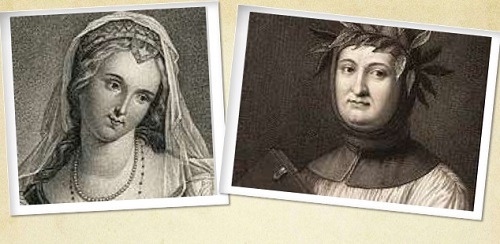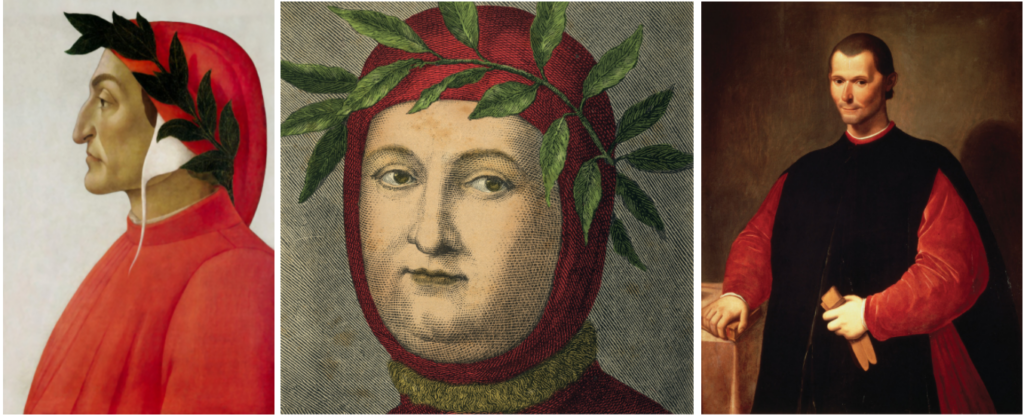Throughout this semester, we have learned and read the works of several Italian writers and poets, including Dante Alighieri, Francesco Petrarca, Giovanni Boccaccio, and Niccolò Machiavelli. While one topic in these texts was women, it was apparent that religion was a runner-up in terms of significance and popularity. In fact, the majority of these writers followed the Christian, Catholic religions and discussed their points of view on the religion as a whole.

Firstly, this can be viewed in Dante Alighieri’s Divine Comedy. Dante states unequivocally that Christianity is the only genuine religion. Belief in Jesus’ divinity is required for admission to Paradiso (heaven), Purgatorio (purgatory), and, in most cases, Inferno (hell). Dante believes that non-belief is not excused by ignorance of Jesus’ presence. He considers Christianity to be not only the path to happiness but also a necessary component of his concept of what it is to be a virtuous, genuine person, which in turn is a strong opinion for one to have in today’s society since there are so many religions and ways of life. Dante’s devotion to orthodox Christianity and criticism of priests reflect his fears and concerns about the Church’s foundation. He was also very adamant about his beliefs of the separation of church and state. He describes his constant anger for church officials who abandon their religious duties in order to obtain wealth and power. For instance, in Canto 33, Archbishop Ruggieri is found in the second band of the ninth circle. Here Ugolino, an innocent man found guilty alongside his four sons by Ruggieri, is found chewing on Ruggieri’s head. Since the archbishop left them locked in a tower and starved them to death after Ugolino clearly put his trust in the archbishop, he was now condemned to Antenora, the traitor’s band of the ninth circle, with his head being chewed off by the man he betrayed forever. This is one of many stories portrayed in the Divine Comedy by Dante that clergymen are punished due to their wrongdoings in life.

Additionally, religion, though not the main factor in Il Canzoniere by Francesco Petrarca, is a vital factor in the development of the text. His poems, mainly inspired by his lover, Laura, show him on his path to reach happiness and glory. However, he realizes that only faith in Christianity is how he can achieve this glow and happiness. This leaves him in a constant war with himself regarding love and religion. In Canzoniere 264, Petrarca states “I go thinking, and so strong a pity for myself assails me in thought, that I’m forced sometimes to weep with other tears than once I did: for seeing my end nearer every day, I’ve asked God a thousand times for those wings with which our intellect can rise from this mortal prison to heaven.” (“Petrarch (1304–1374) – The Complete Canzoniere: 245-305”) This depicts Petrarca contemplating the cost of his devotion to Laura. He is in excruciating pain as a result of it. He considers his love for Laura to be a threat and distraction to his faith.
Although Catholicism was prominent during this time, Boccaccio on the other hand made it clear that he did not approve of the Church’s activities and behavior, remarkably similar to Dante. Religion was seen to be practiced by foolish people in The Decameron. He saw that the church was a breeding ground for evil, and “marriage” was a meaningless transaction. The Decameron Web also describes that these texts were seen to be “a favorite topic of mockery” when it came to religion. His Day One, Story One in The Decameron regarded a man that made many sins, by the name of Messire Chappelet du Prat, but because he confessed all of his sins before he died, The Friar left thinking that this enormous sinner was a truly holy man. This man was declared a saint and was admired by Catholics. The main narrative was criticism of saint adoration and the Catholic Church’s organization and infrastructure, but not on Catholicism as a religion.
Also similar to Dante, Machiavelli attempted to subjugate religion to the state and give the state a non-religious character by totally separating religion from politics. He considered politics to be a separate activity with its own set of rules and regulations. In The Prince, Machiavelli frequently argued that religion was fabricated and that it was utilized to impose oppressive laws, additionally believing that Christianity made people unproductive and weak. The Prince cannot be bound by moral or religious reasons and he exists beyond morality. He may achieve his goals by depending on faith. Religion has no power over politics, and the church has no authority over the state. As a result, he proposed separating religion, morality, and politics. In political concerns, the king has the last say, and all other centers must be subject to political authority. In Chapter 18, he instructs Lorenzo with astounding, if not reckless, honesty, “There is nothing more important than appearing to be religious.” Here he is stating that even if a Prince may act the opposite, he should always be perceived as religious amongst other things. Machiavelli understands that many individuals are prepared to accept all types of dishonesty as long as their country is wealthy, prosperous, and peaceful. The most problematic component of Machiavelli’s life was his views on religion, particularly Christianity because the worst aspect of the age in which he lived was the prevalent corruption and greed among the Italian authorities and church officials.
Overall, religion is a common theme amongst these writers. Though many of them are known to be religious, they do not agree with Church. In other words, they disagreed with the Christian and Catholic infrastructure because of the constant corruption found and had no issue sharing their opinions on this. Many were in fact known as humanists of the Renaissance era.
- ProQuest Ebook Central – Reader – ebookcentral.proquest.com. (n.d.). Retrieved December 27, 2021, from https://ebookcentral.proquest.com/lib/nu/reader.action?docID=1707383&ppg=366
- Decameron web. Decameron Web | Themes & Motifs. (n.d.). Retrieved December 27, 2021, from https://www.brown.edu/Departments/Italian_Studies/dweb/themes_motifs/module/religion/
- Petrarch (1304–1374) – The Complete Canzoniere: 245-305, https://www.poetryintranslation.com/PITBR/Italian/PetrarchCanzoniere245-305.php.
- Petrarca, Francesco, Selected Poems from the Canzoniere
- Quia – Machiavelli the Prince Ch. 18. www.quia.com/files/quia/users/p00080817/Machiavelli_The_Prince_Ch._18.pdf.



